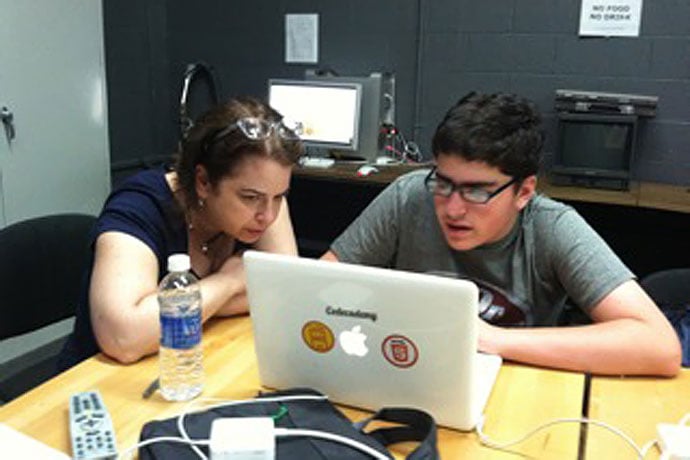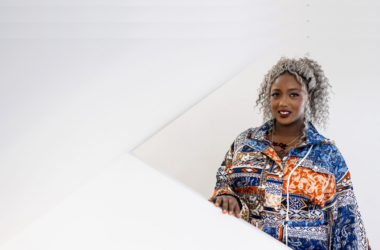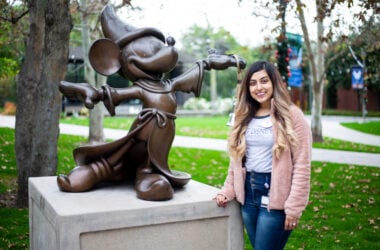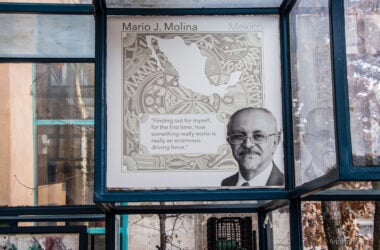In the United States, an estimated seventy percent of children on the autism spectrum are between the ages of 3 and 14 years old. This is a real-life crisis as a tsunami of kids are reaching adolescence and will soon become adults. Many of these children are bright and capable of more than menial labor. They simply learn differently and may need a range of adaptations required to have a successful and meaningful life in society.
Finding ways to help this group of children is something Beth Rosenberg of Tech Kids Unlimited has worked on since 2009. She is an education technologist with experience working in the education department at the Guggenheim Museum and was the founding education director at Eyebeam Center for Arts and Technology. Her not-for-profit project, Tech Kids Unlimited (TKU), helps kids with special needs learn technology. How she does this is a great story.
Tim: How did Tech Kids Unlimited come about?
Beth: It came about because of my son. It's like a twist on the old feminist statement, "the personal is political." My own kid who has special needs, has always really liked technology. I saw how adept he was with technology, how much he loved it. I wanted to do something exciting for him and with him. The idea came about with him in mind, his needs and interests. I like to say that I may be the founder of Tech Kids Unlimited, but he is the Artistic Director!
As a special needs education consultant, I happened to be touring a school, about 4 years ago, in 2009, and I saw this beautiful Mac lab and I asked, "What are you doing with this lab?" I wondered aloud if they would give the space to me for a school program, a pre-camp program, before all the kids go to summer camp, and they said yes. I had the curriculum and I had the tech teaching artist. In the end, it just didn't work out to do it at that school, but then I realized I didn't need that space. I knew where to find other lab spaces. Earlier in my career, I went from the education department at the Guggenheim Museum to be the founding education director at the Eyebeam Center for Art and Technology. I knew how to make a program happen. So I opened up my address book. Overnight, several spaces said, "yes, you can have our lab for free." With space, I sat down to develop the curriculum and program. The first one week workshop, in the summer of 2009, was on i-stop animation and it sold out. I staffed the workshop with a tech teaching artist, a social worker, and high school students doing community service. At TKU, we work with a very high student/teacher ratio.. Classes are approximately 3 to 1 kids to teacher ratio.
I knew technology was a great tool having done workshops at the Eyebeam Center for Art and Technology, teaching students how to create websites, using Lego MindStorms, and partnering with MIT Media Lab and Oxygen TV in the late 1990s. I knew the power of technology when you put it into the hands of students. Now, I only want to work with special needs students. The opportunities for these kids are often very limited. As my child gets older "” he's fifteen "” the social aspect is very important and there's very little available to teach special needs kids technology in an appropriate social environment. It was a combination of the right place, right time and a hunch. I knew if my son was interested in technology, probably his friends and kids his age were also interested. It turned out my assumption was true.
Tim: How do kids benefit from your program?
Beth: I like to think of Tech Kids Unlimited as a career skill building program. With lots of adults in the classroom and a main tech teaching artist and a social worker, as well as additional counselors who are high school, undergrad or grad students, the kids can learn the technology easily. The tech teacher doesn't have to stop the whole class if one or two kids have questions or need help to process the information. The social worker can step in for the kids who need them, or the counselors can step in to help a specific kid with a question. Everyone gets back to doing their work.
The challenge is, for kids who learn differently: can we give these kids real technology skills they can write on their resumes, use to get internships, and ultimately have meaningful careers?
I like to tell the story of how in the HBO TV show Girls, the young girl fresh out of college is financially cut off from her parents. She then goes into the literary agency where she works as an unpaid intern to ask her boss for a paid job, pointing out that another intern had graduated to a paid job, only to have him say, "Well, Susan knows Photoshop and you don't." End of story. It's revealing. Here she is a college graduate and that's the state of affairs. You can be a college graduate but, if you don't have technology skills, no one will hire you.
I want to give these kids opportunities to work in technology, or any company, but they need to know more than Word, PowerPoint, or Excel. It comes down to, what is your skill set? If our kids have social issues, can we get them to a very high skill set?
Kids on the autism spectrum, kids who learn differently, kids with ADD, OCD, anxiety, kids with sensory and other issues, all deserve an opportunity to live a successful and meaningful life. You don't want to be forced to pack groceries if you have gifts and talents like everyone else, but in order for them to come out, they need to be cultivated differently. And many of these kids can understand code or software like Photoshop at a deep level. Many of these kids are happy to spend hours at a computer creating things or solving problems.
Our workshops also include time to talk with successful people in technology and the arts about how they got started in their careers. Many successful people in technology and the arts didn't do well in school. They even hated school. Instead, they found jobs and opportunities that interested them which built on their interests. They're great role models for our kids.
In the future, once I have a group of 16 and 17 year olds I want to place them in various tech internships. My plan is to have these students work at start-ups where I can use my various contacts. I'm part of a social entrepreneurship program called Goodnik.org which meets at the tech incubator Alley/NYC. I want to help these kids evolve from tech classes to actual projects to work.
Tim: How do parents respond to your workshops?
Beth: Parents see their kids as really interested in technology. The TKU message is: Turn your kid from consumer to producer. Have them create the game instead of only playing the game. Have them build the website instead of only using websites. Parents get this message and want to sign their kids up to learn tech.
Kids who learn differently also tend to not be on sports teams. They do a lot of TV watching and video game playing. They play mostly on their own. Parents can get their kids out of the house more easily with Tech Kids Unlimited workshops, in a way that helps the kids learn skills and make friends.
This week my son asked who's in the Sunday workshop to see if he knew any of the kids. He was excited that he knew two of the kids even though they go to different schools. The workshops are a great way for these kids to connect and expand their pool of social interactions with peers.
Tim: What is the typical schedule kids go through in your workshops?
Beth: The typical workshop is a week long which we hold in February and throughout the summer school vacation in July/August. We start our program at 10 am and pick up is at 4 pm. From 10-12 it's teaching time, 12-1 is lunch, 1-3 is more teaching time, and 3-4 is the guest lecture where a technology professional talks about how they got to their position and then answers questions. Our new fall workshops are Sunday afternoons, 4:30 to 6:30, with a 90 minute tech experience and at 6, pizza, drinks and snacks with thirty minutes to socialize with board games and a Wii. This is held at our new partner site — The Ability Lab at NYU-Poly's MAGNET space in downtown Brooklyn. It's a chance for the kids to be social and make new friends.
Tim: How do your workshop teachers, social workers, and assistants find working with special needs kids? What sorts of challenges do they work with?
Beth: The counselors who are high school, undergrad or grad students love to work with kids. I teach them about the profile of kids they'll work with. I teach them, for example, about the need to repeat instructions or the need for extra patience and kindness. These are young adults who really love kids and want to give back. Often they have siblings or cousins who learn differently and, because of their own personal experiences, they want to help other kids.
The counselors also learn a real skill set, working and teaching kids who learn differently. One counselor got a paid job with a family to help tutor and pick up a kid whom they met at the workshop. Everyone benefits. It creates a culture of tolerance and acceptance.
Tim: Do you plan to expand your program beyond the New York City area? Is there interest from parents? What would you change, if anything?
Beth: I do want to expand from our current locations in Manhattan and Brooklyn. The next logical places are Westchester and Long Island. I'd also like to look at California where one of my star tech teaching artists moved just recently. A friend told me it is very difficult to raise a special needs kid in parts of California as the school options are very different than East Coast, but I need to do more research and raise funds before that becomes possible.
Tim:At the end of the day, what makes you happiest about your involvement with Tech Kids Unlimited? What gets you excited about the group?
Beth: I really want to change the paradigm of education and jobs for kids who learn differently. I want to use technology to create the next generation of technologists for kids who have challenges. Not just the quirky kids like Bill Gates or Mark Zuckerberg. Our kids in this program have complex learning and social challenges. They have more than one label or diagnosis. Can we take all these wonderful kids and get them to act on their interests, teach them about technology, and have them pursue their interests after high school to ultimately get jobs and change the world? I think we can! I'd like Tech Kids Unlimited to be the place where kids with learning differences go to get pre-employment tech and career skills. I want to show society that these kids are not a drain on the system and that they have important things to contribute to the world.
It's so fun to be with these kids. They're funny, quirky and they make you laugh every way possible. And they often teach you about life. One kid who may find it hard to have a conversation with adults or peers might come up with something incredibly brilliant with code or software. They have so much inner talent which technology helps them get out.
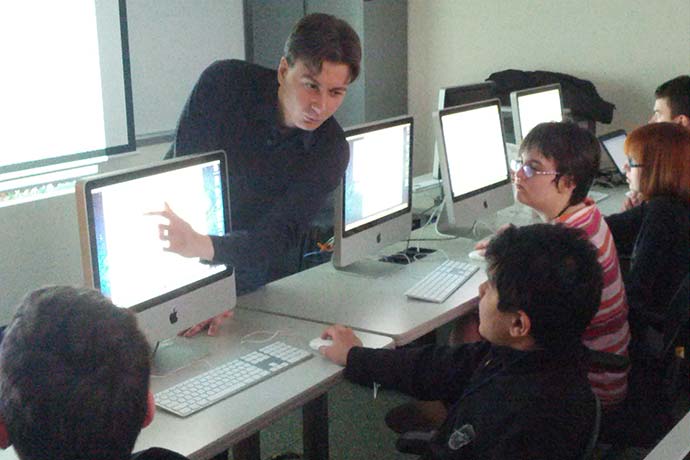
Learn More
Tech Kids Unlimited
http://www.techkidsunlimited.org/






